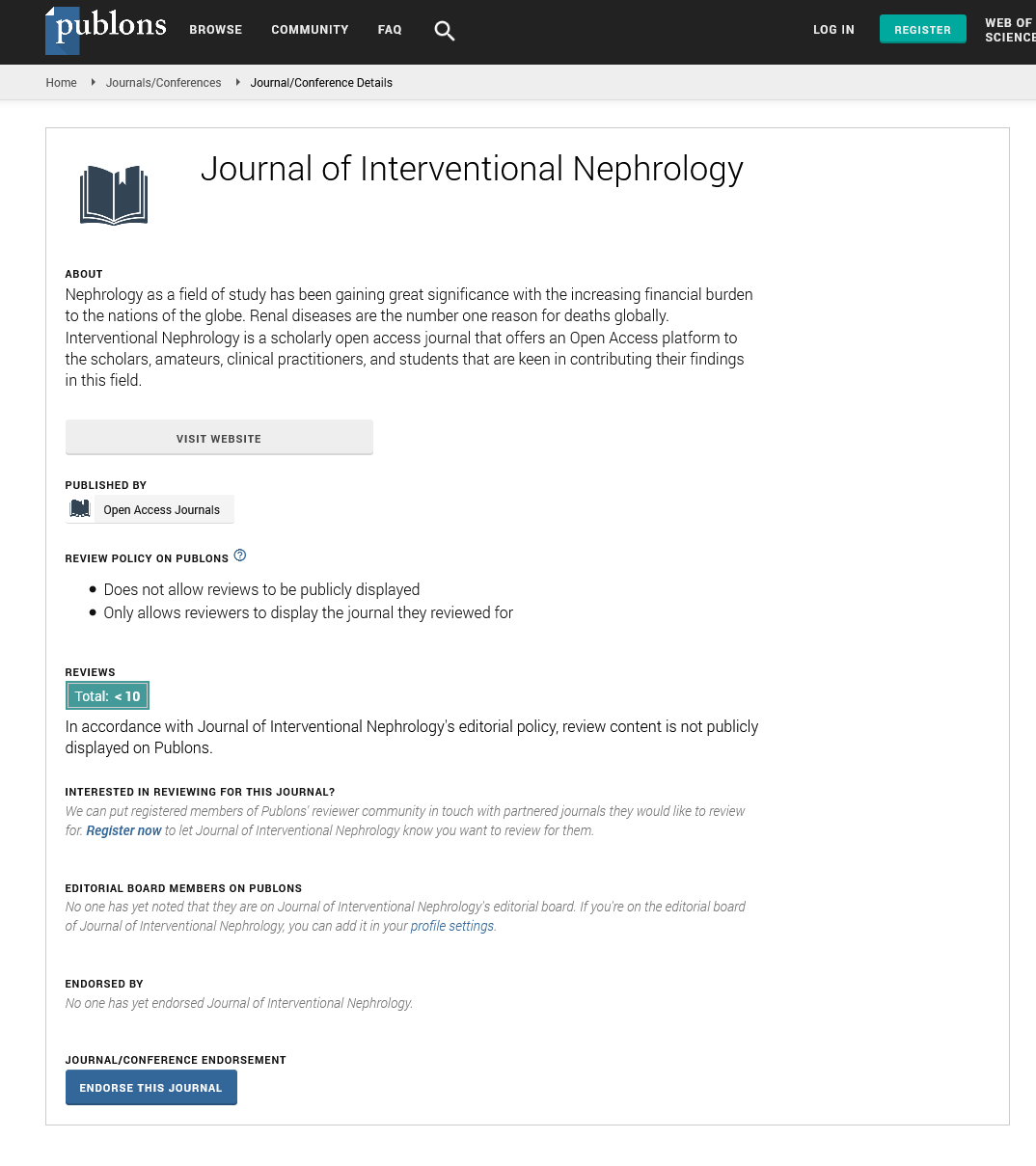Perspective - Journal of Interventional Nephrology (2024) Volume 7, Issue 5
Future Directions and Research in Interventional Nephrology: Pioneering Innovations and Emerging Trends
- Corresponding Author:
- Elsa Ersoy
Department of Nephrology,
Parul University,
Germany
E-mail: Ersoyelsa2233@esed.edu
Received: 20-Sep-2024, Manuscript No. OAIN-24-148449; Editor assigned: 23-Sep-2024, PreQC No. OAIN-24-148449 (PQ); Reviewed: 07-Oct-2024, QC No. OAIN-24- 148449; Revised: 14-Oct-2024, Manuscript No. OAIN-24-148449 (R); Published: 23-Oct-2024, DOI: 10.47532/oain.2024.7(5).316-318
Introduction
IInterventional nephrology, a specialized field within nephrology, focuses on minimally invasive procedures for managing kidneyrelated conditions. As advancements in technology and medical practices continue to evolve, the future of interventional nephrology promises significant innovations and improvements. This article explores the anticipated future directions and research areas in interventional nephrology, highlighting emerging trends, technological advancements, and areas of potential growth that could transform patient care and outcomes.
Description
Advancements in technology and techniques
Enhanced imaging modalities
• High-resolution imaging: Future research is
likely to focus on developing high-resolution
imaging techniques that offer greater
precision and clarity during interventional
procedures. Advanced imaging modalities,
such as next-generation ultrasound and
Magnetic Resonance Imaging (MRI), will
improve the visualization of renal structures
and guide interventions with higher accuracy.
• Real-time integration: Integration of
real-time imaging with procedural tools
is expected to enhance the safety and
efficacy of interventions. Innovations such
as Augmented Reality (AR) and Virtual
Reality (VR) may allow for real-time
visualization of anatomical structures
during procedures, providing enhanced
guidance and reducing complications.
Robotic-assisted procedures
• Robotic surgery: Robotic-assisted technologies
are poised to revolutionize interventional nephrology by providing greater precision
and control during procedures. Robotic
systems can facilitate complex maneuvers
with minimal invasiveness, potentially
improving outcomes and reducing recovery
times for patients.
• Automation and AI integration: The
integration of Artificial Intelligence (AI)
with robotic systems may offer advanced
automation capabilities, such as automated
navigation, predictive analytics, and
adaptive procedure adjustments. These
technologies could enhance procedural
accuracy and optimize patient-specific
treatment approaches.
Innovations in device design and materials
Bioengineered materials
• Biocompatible grafts: Research into
bioengineered materials aims to develop
more durable and biocompatible vascular
grafts for dialysis access. Innovations in
materials science may lead to grafts that
resist thrombosis and infection while
promoting better integration with native
tissues.
• Smart devices: The development of
“smart” medical devices with embedded
sensors and real-time monitoring capabilities
is expected to advance. These devices
could provide continuous feedback on
access function, detect complications
early, and allow for timely interventions.
Drug-eluting technologies
• Drug-coated balloons and stents: Ongoing research into drug-eluting technologies is likely to focus on improving the efficacy of drug-coated balloons and stents used in dialysis access procedures. Enhanced formulations and delivery mechanisms may reduce the risk of restenosis and prolong the lifespan of access sites.
• Targeted drug delivery: Future advancements may include the development of targeted drug delivery systems that release therapeutic agents directly at the site of intervention. This approach could enhance treatment outcomes and minimize systemic side effects.
Personalized and precision medicine
Genomic and biomarker research
• Genetic profiling: Advances in genomics
may lead to personalized approaches to
interventional nephrology by identifying
genetic predispositions to kidney diseases
and tailoring interventions based on
individual genetic profiles. This research
could enhance the precision of diagnosis
and treatment strategies.
• Biomarkers for monitoring: The identification
of novel biomarkers for monitoring disease
progression and treatment response is a key
area of research. Biomarkers could enable more
accurate assessment of patient conditions and
guide personalized treatment plans.
Patient-specific interventions
• Customized treatment plans: The future
of interventional nephrology may involve
developing customized treatment plans
based on patient-specific factors, including
genetic, lifestyle, and disease characteristics.
Personalized interventions could improve
efficacy and minimize adverse effects.
• Adaptive techniques: Research into
adaptive techniques that adjust procedural
approaches based on real-time patient data
is expected to enhance treatment precision.
Adaptive interventions could optimize
outcomes by tailoring procedures to
individual patient needs.
Expanding access and global collaboration
Addressing healthcare disparities
• Affordable technologies: Efforts to develop
cost-effective technologies and scalable
solutions will be crucial for improving access
to interventional nephrology care in lowand
middle-income countries. Research
may focus on creating affordable devices
and procedures that can be implemented in resource-limited settings.
• Training and education: Expanding training
and education programs for healthcare
professionals worldwide is essential for
improving the quality of interventional
nephrology care. Collaborative initiatives
between institutions and organizations
can enhance skills and knowledge in
underserved regions.
International research collaborations
• Global research networks: The establishment
of global research networks and collaborative
platforms will facilitate the sharing of
knowledge, resources, and innovations
in interventional nephrology. International
partnerships can drive advancements in
research and promote the adoption of best
practices across different regions.
• Shared databases and registries: Creating
shared databases and registries for interventional
nephrology procedures and outcomes will
enable researchers to analyze large datasets,
identify trends, and develop evidence-based
guidelines. These collaborative efforts can
lead to more informed decision-making and
improved patient care.
Future research priorities
Long-term outcomes and effectiveness
• Longitudinal studies: Future research
should focus on conducting longitudinal
studies to assess the long-term outcomes
and effectiveness of new technologies and
interventions. Understanding the long-term
impact of procedures on patient health and
quality of life will be crucial for optimizing
care strategies.
• Cost-effectiveness analysis: Evaluating the
cost-effectiveness of emerging technologies
and interventions will help guide resource
allocation and decision-making. Research
into the economic impact of new approaches
will be essential for ensuring sustainable and
equitable healthcare solutions.
Patient-centered research
• Patient perspectives: Incorporating patient
perspectives into research is vital for developing
interventions that align with patient needs
and preferences. Studies exploring patient
experiences, satisfaction, and outcomes can
inform the design of more patient-centered approaches in interventional nephrology.
• Quality of life assessments: Research
focusing on the impact of interventional
procedures on patients’ quality of life will
provide valuable insights into the holistic
benefits of treatment. Assessing factors such
as functional status, psychological wellbeing,
and social support will enhance the
overall patient experience.
Conclusion
The future of interventional nephrology is marked by promising advancements and exciting research opportunities. Innovations in technology, device design, personalized medicine, and global collaboration are set to transform the field and enhance patient care. By focusing on emerging trends, addressing healthcare disparities, and prioritizing patient-centered research, the field of interventional nephrology can continue to evolve and improve the lives of individuals with kidney-related conditions.


